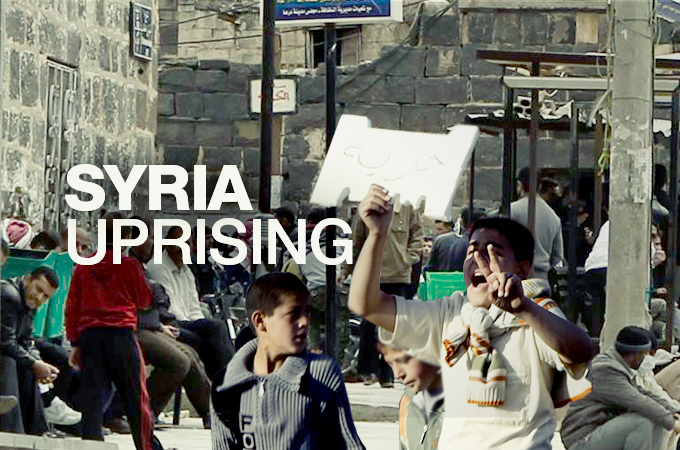Syria accused of crimes against humanity
Amnesty International says it has gathered proof of such crimes by the government in the northern town of Tall Kalakh.

The Syrian government’s violent suppression of the revolt against its rule could amount to a systematic campaign of crimes against humanity, a human rights group has said.
London-based Amnesty International says it has gathered proof of such crimes by the government in the northern town of Tall Kalakh.
The organisation called for the UN Security Council to refer the Syrian government’s massive repression, which has come in response to continuing protests against President Bashar al-Assad’s rule, to the prosecutor of the International Criminal Court, in a report released on Wednesday morning.
“The willingness of the international community to take action on Libya in the name of human rights has highlighted its double standards on Syria,” Philip Luther, Amnesty International’s Middle East and North Africa deputy director, said.
 |
The testimony gathered from witnesses from Tall Kalakh suggests systematic and targeted abuses aimed at trampling dissent, Luther said.
“Most of the crimes described in this report would fall within the jurisdiction of the International Criminal Court,” Luther said.
“But the UN Security Council must first refer the situation in Syria to the Court’s Prosecutor.”
In a pattern followed in towns across the country since the wave of protests began, army and security forces entered Tall Kalakh on May 14 after a demonstration against the government, Amnesty said.
Security forces fired indiscriminately on civilians, killing eight. Scores of men and boys were arrested, most of them tortured, according to evidence collected by Amnesty. Some of them remain in detention, weeks later.
‘Violent repression’
Rights groups say that more than 1,300 civilians have been killed and 10,000 people arrested by security forces since the revolt against Assad began in mid-March.
The Amnesty report comes as the Syrian government turns its attentions to the central city of Hama.
Tanks were still surrounding Hama, days after it witnessed some of the biggest protests against Assad’s rule since the recent uprising started.
The attacks focused on two districts north of the Orontes River, which splits the city of 650,000 people in half.
Some residents of Hama, scene of a crackdown by Assad’s father nearly 30 years ago, had sought to halt any military advance by blocking roads between neighbourhoods with garbage containers, and by burning tyres, wood and metal.
In response to the amplified violence in Hama, world leaders have threatened to increase the pressure on Syria.
“Violent repression in Hama will only further undermine the regime’s legitimacy and raise serious questions about whether it is committed to the reforms it has recently announced,” William Hague, the British foreign minister, said in a statement on Tuesday.
“The UK has made clear that President Assad must reform or step aside. If the regime continues to choose the path of brutal repression, pressure from the international community will only increase.”
Hague was in Jeddah on Tuesday for talks with Saudi officials on the uprisings that have swept the region.
The US, meanwhile, called on Syria to withdraw its forces from Hama.
“We urge the government of Syria to immediately halt its intimidation and arrest campaign, to pull its security forces back from Hama and other cities, and to allow Syrians to express their opinions freely so that a genuine transition to democracy can take place,” Victoria Nuland, a spokesperson for the US state department, said.
Nuland said Washington was “very concerned about the ongoing attacks against peaceful demonstrators in Syria”.
‘Point of no return’
France, which has taken a tougher stance on Syria than its Western allies, said on Tuesday there were signs Russia was beginning to question its Syrian stance after seeing Assad continue the bloody crackdown.
Russia has opposed a French-led UN Security Council draft resolution, which condemns Assad’s government and urges it to adopt rapid change, but stops short of imposing sanctions or allow military action.
Moscow has accused Western countries of exploiting the Security Council resolution that authorised limited military intervention in Libya and says it fears that could happen again in Syria.
Alain Juppe, France’s foreign affairs minister, attempted to sway his Russian counterpart, Sergei Lavrov, in Moscow last week, but said on Tuesday that Russia was still threatening to use a veto against the resolution.
“I pointed out that there was nothing in it that resembles paragraph 4 [of the Libya resolution], but I still haven’t convinced him [Lavrov],” Juppe told the French parliament’s foreign affairs commission.
“I think the point of no return has been crossed and the ability for Assad to make reforms today is zero in view of what has happened,” Juppe said.
“But to facilitate the emergence of a consensus at the UN Security Council we accepted to once again address Assad and to ask him to sign up to reforms.”
France has also failed to convince South Africa, India and Brazil to vote in favour, leaving the resolution short of the minimum 11 of 15 votes it feels it needs to submit the resolution.